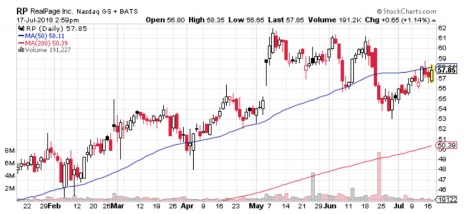There seems to be more and more chatter lately about the potential for a stock market retreat in the coming months. Most of the reasoning ties back to: how much the market has run over the last decade, potential distress signals resulting from the flattening of the yield curve, trade war sabre rattling, overhead resistance in the S&P 500 Index, and/or predictions that we are getting late in this business cycle.
If you subscribe to any of these notions, you should start thinking about some defensive positioning in your portfolio. (And I have just the defensive small-cap growth stock in mind. More on that in a bit.)
On the other hand, there is a practical challenge with becoming too defensive too early, especially when momentum is carrying many stocks higher. There is no bell that rings at the top!
It’s very hard to correctly anticipate a big trend change, even for the most experienced investors. And when we look at forward revenue, earnings and profit margin estimates, as well as stock charts, things look pretty good, especially in the world of small-cap software-as-a-service (SaaS) stocks.
So how do we work in some defensive positioning without overdoing it?
[text_ad use_post='129618']
In these murky times, one of the ways to ride the fine line between being too aggressive and too conservative is to buy defensive small-cap growth stocks.
What is a Defensive Stock?
The criteria for what qualifies as a defensive small-cap growth stock is, admittedly, subjective. In the context of today’s topic this means small-cap SaaS stocks with extremely loyal subscriber bases.
To understand how loyal a subscriber base is you can look at metrics such as subscriber growth, average revenue per user (ARPU) and subscriber retention rates. You can also consider how long it takes a company to start generating profits from new subscribers. In many cases, for cloud software stocks, this can take a year or more. But then those customers are profitable every single successive year, which generates reliable cash flow.
These metrics factor heavily into a management team’s forward guidance. The more reliable a company’s customer base is, the more reliable the guidance will be.
When projected revenue and earnings growth is more reliant on keeping existing customers than attracting new ones, a company can be said to more of a defensive growth investment. These are the companies you want to own when you’re feeling uneasy about the market’s next direction.
I’ll be talking in more specific terms about defensive small-cap growth stocks at this year’s annual Cabot Wealth Summit, which runs from August 15-17 in the historic town of Salem, Massachusetts. You should come! Just click here to get the details.
RealPage (RP) is the Real Deal
One of the small-cap SaaS stocks I recently featured in Cabot’s Small-Cap Cloud Software Special Report fits the bill. The company is RealPage (RP), and it provides software and data analytics to the real estate industry.
RealPage’s platform offers a wide range of solutions for single-family, multi-family and vacation property owners to purchase, lease, manage and optimize their properties. These solutions cover all sorts of operations, from sales and marketing, property management, utility management, automated payments, renters’ insurance, applicant screening and more.
As real estate markets have come back from the recession RealPage has enjoyed steady growth. Revenue has been up an average of 16% over the last five years, including 18% (to $671 million) in 2017 and 32% in Q1 2018.
It doesn’t look like the growth streak is coming to an end. Analysts forecast revenue will grow by 28% in 2018. RealPage is also quite profitable, with EPS up 22% to $0.93 in 2017, and expected to grow another 60% (to $1.49) in 2018.
All the key metrics, including average customer value, units under management and revenue per unit, are all trending in the right direction, despite some distortion from acquisitions. Customer retention is around 96%, versus closer to 90% for a large peer group.
This year, RealPage should have an operating profit margin of around 24%, versus under 3% for the same peer group. And using the favored valuation metric for SaaS stocks, which is enterprise-value-to-forward-sales (EV/2019 sales), RealPage is trading at a discount. Its EV/2019 sales ratio is 5.8, versus roughly 7.6 for peers.
Admittedly, RealPage isn’t going to blow growth investors away in 2019 when expected revenue growth is 12%. But on the flip side investors get a high degree of confidence RealPage will meet or exceed consensus estimates, and the stock trades at a cheaper valuation than peers. That’s the definition of a defensive small-cap growth stock!
There is, of course, potential for RealPage to surprise to the upside too. It has a history of doing so. The sales team has demonstrated ability driving customers to use more solutions the longer they stick with RealPage (in other words, average revenue per user is trending up). Acquisitions are helping to expand the solution set, so there is always more to sell existing customers.
The latest new product to hit the market was Kigo Marketplace, a global platform that optimizes the management of short-term rental inventory. The product pitch is that Kigo lets short-term rental property managers reduce many of the fees paid to third parties, while letting them build out their brands independent of lead generation channels.
RealPage also acquired Lease Rent Option (LRO) in December, which brought in an industry-specific data analytics and asset optimization suite. And in October it acquired PEX Software, which provides solutions similar to RealPage’s, but targeting the UK, EU and Australian private rental and student housing markets.
With a market cap of nearly $5.2 billion today, RealPage has come a long way from its founding in 1998, when it began as Rent Roll, an on-premise property management system for rental housing markets.
Over the years it has evolved into a provider of cloud-bases SaaS solutions, and is on track to achieve its goal of $1 billion in annual revenue by 2020. The company is now the largest provider in its space.
Shares have been on a consistent uptrend. And in recent history buying around the 50-day line, where the stock is right now, has worked out well.
I think you can pick up shares now. And keep an eye on both the 52 to 54 area and the 200-day line (currently at 50.39) as key stop loss levels. Look for quarterly earnings to come out around the end of July.
The Best Defensive Small-Cap Growth Stock
RealPage is one of 10 small-cap SaaS stocks featured in Cabot’s Small-Cap Cloud Software Special Report. I put together this report due to high demand from Cabot Small-Cap Confidential subscribers who wanted more small cap SaaS stock ideas. The average gain in our portfolio is nearly 80%!
Some of these small cap SaaS stocks have defensive characteristics, like RealPage, with large existing userbases that account for the majority of their implied value.
Others are more traditional growth stocks, with rapidly expanding userbases and supernormal revenue growth rates.
Since we first published Cabot’s Small-Cap Cloud Software Special Report in late March our average gain is 17%. That’s 15% better than the S&P 500 over the exact same time frame!
Most of these stocks are trading above their 50-day lines.
As with any stock I cover, each stock needed to clear several critical hurdles before being considered for inclusion.
It had to be a pure-play small cap benefiting from a long-term growth trend.
It needed to have a great business model.
And it needed to have excellent products now and show evidence that more excellent products are coming in the future.
Whether you think the market’s going up or down in the coming months, you’ll find something to whet your investing appetite in this report. And for a limited time, this special report is being offered with a subscription to Cabot Small-Cap Confidential. Just click here to get started now.
[author_ad]


